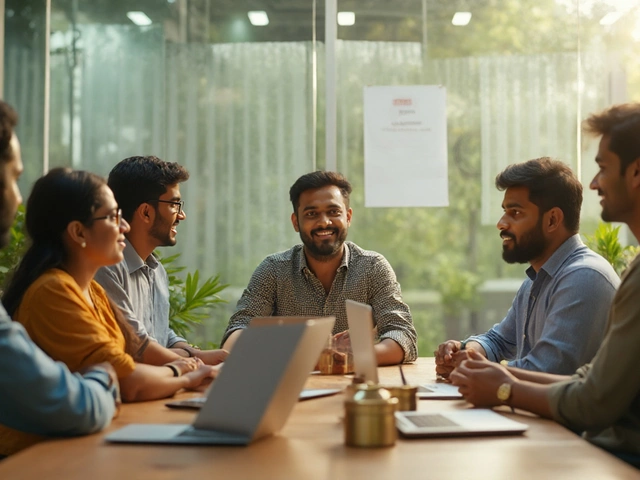Trading Course Comparison Tool
Find Your Ideal Trading Course
Answer a few questions to get personalized recommendations based on your budget, schedule, and career goals.
Recommended Courses
Pro Tip: Start with free resources like Zerodha Varsity before investing in paid programs.
All courses shown here include SEBI-compliant content. For professional roles, prioritize SEBI-accredited certifications like NISM or NCMP.
India’s stock market is booming, but finding the right place to learn trading can feel like navigating a maze. Whether you want to trade stocks, commodities, or derivatives, the right education can cut years off the learning curve and protect your capital. Below is a practical roadmap that helps you spot the best trading courses India offers, compare online and offline options, and pick a program that matches your schedule, budget, and career goals.
Quick Takeaways
- Online platforms like Zerodha Varsity and Angel Broking Academy offer free or low‑cost modules that suit beginners.
- Institution‑run programs such as NISM and NSE Academy provide SEBI‑recognised certifications, essential for a professional trading career.
- Consider factors: curriculum depth, live market exposure, mentorship, and post‑course support.
- Typical fees range from ₹0 (free) to ₹25,000 for intensive certification courses.
- Start with a free demo, then graduate to a paid, accredited program for credibility.
How to Choose the Right Learning Path
Before diving into any institute, answer these three questions:
- What market segment do you want to trade - equities, futures, forex, or commodities?
- Do you need a formal certification to work with brokerage firms or financial institutions?
- How much time can you dedicate each week - a few hours, or full‑time study?
Your answers will narrow the field to either self‑paced online courses or structured classroom programmes.
Top Online Trading Academies
Online platforms excel at flexibility and cost‑effectiveness. Below are the most reputable ones as of 2025.
Zerodha Varsity is a free, self‑paced learning portal created by India’s largest discount broker, covering basics to advanced technical analysis. It includes video lessons, quizzes, and real‑time charting tools that let you practice on the same platform you’ll trade with. The curriculum aligns closely with SEBI guidelines, making it a solid primer before you chase formal certification.
Angel Broking Academy offers structured video modules, live webinars, and a mentorship program that connects learners with experienced traders. While most content is free, the premium ‘Pro’ tier costs ₹9,999 and adds one‑on‑one coaching and a mock‑trading sandbox.
ICICI Direct Learning Center provides a mix of free articles, short courses, and a paid ‘Certified Equity Trader’ program that costs ₹12,500. The certification is recognised by many Indian brokerages and includes a 30‑day job‑placement assistance window.

Institution‑Backed Certifications
If you aim for a career in trading, fund management, or compliance, a SEBI‑recognised certificate adds credibility. Here are the top accredited bodies.
National Institute of Securities Markets (NISM) is a public trust set up by SEBI that offers 17 certification courses covering equities, derivatives, mutual funds, and financial advising. The flagship ‘NISM SeriesV‑A: Mutual Fund Distributors Certification’ costs ₹5,000 and is mandatory for anyone selling mutual fund products.
NSE Academy delivers industry‑focused modules such as the ‘NSE Certified Market Professional’ (NCMP) and ‘NSE Academy Certified Options Strategist’. Fees range from ₹8,000 to ₹20,000, and the courses include live market simulations and access to NSE’s data feeds.
BSE Institute Ltd. runs the ‘BSE Certified Equity Trader’ program, a 6‑week intensive that blends classroom sessions with real‑time trading labs. The cost is ₹15,000, and graduates often receive interview opportunities with BSE‑affiliated brokerage houses.
Comparison Table - Best Trading Learning Options in India (2025)
| Provider | Format | Cost (₹) | Duration | SEBI Accreditation | Best For |
|---|---|---|---|---|---|
| Zerodha Varsity | Online, self‑paced | Free | Variable | Guideline‑compliant | Beginners seeking zero cost entry |
| Angel Broking Academy (Pro) | Online + live mentorship | 9,999 | 4 weeks | Guideline‑compliant | Hands‑on learners who want coach support |
| ICICI Direct Certified Equity Trader | Hybrid (online + offline labs) | 12,500 | 6 weeks | Recognised by brokerages | Career‑oriented traders |
| NISM Certification (SeriesV‑A) | Online exam + study material | 5,000 | Self‑paced (exam within 30days) | Official SEBI certification | Professional distributors & advisors |
| NSE Academy - NCMP | Online + live market sims | 15,000 | 8 weeks | SEBI‑recognized | Future stock‑exchange employees |
What to Expect After Completion
Finishing a course is just the first step. Most top institutes provide a post‑course support system:
- Job placement assistance: BSE Institute partners with 30+ brokerage firms for campus‑style hiring.
- Alumni networks: NISM and NSE Academy maintain active LinkedIn groups where members share trade ideas and job openings.
- Continuing education: After the flagship program, many platforms offer advanced modules on algorithmic trading, options Greeks, and risk management.
Leverage these resources to transition from theory to a paying trading role within 3‑6months.

Common Pitfalls and How to Avoid Them
Even the best programmes can leave gaps if you ignore some red flags:
- Over‑reliance on promises of guaranteed returns. No legitimate institute can promise profits - they should teach risk management, not hype.
- Skipping the mock‑trading phase. Live markets are noisy; practising on a demo account for at least 30days is essential.
- Ignoring SEBI accreditation. A non‑accredited certificate won’t open doors in regulated firms.
Choose courses that stress these realistic expectations and provide tangible, trackable outcomes.
Next Steps - Build Your Learning Roadmap
Here’s a simple 4‑step action plan you can start today:
- Sign up for a free account on Zerodha Varsity and complete the ‘Basics of Stock Markets’ module (≈3hours).
- Take a diagnostic quiz on NSE Academy’s website to identify knowledge gaps.
- Enroll in the most suitable certification - NISM SeriesV‑A for mutual fund distributing or NCMP for a broader exchange‑focused credential.
- Allocate 10hours per week for study, practice on a demo account, and join the alumni forum of your chosen institute.
Follow this plan, and within a few months you’ll have both the knowledge and the recognized credential to start trading professionally.
Frequently Asked Questions
Do I need a SEBI‑registered certification to trade stocks?
No, retail investors can start trading with a basic demat account. However, certifications like NISM or NCMP are mandatory if you want to work as a professional trader, advisor, or broker.
Are online courses as effective as classroom‑based programs?
Effectiveness depends on your learning style. Online courses offer flexibility and often include interactive simulations, while classroom programs provide direct mentorship and networking. A hybrid approach-online fundamentals followed by a short‑term accredited workshop-works best for most learners.
How much should I expect to spend on a quality trading course?
Free platforms like Zerodha Varsity cover the basics. For a recognized certification (NISM, NCMP) budget between ₹5,000 and ₹20,000. Premium mentorship programmes may go up to ₹25,000.
Can I get job placement after completing a certification?
Institutes like BSE Institute and ICICI Direct offer placement assistance or interview shortlists. While placement isn’t guaranteed, alumni networks often share openings that can lead to a job within 3‑6months.
What’s the best way to practice trading without risking money?
Open a demo account with any major broker (Zerodha, Angel Broking, ICICI Direct). Treat the virtual capital like real money-set stop‑losses, track P&L, and stick to your strategy for at least 30days before moving to a live account.





Write a comment